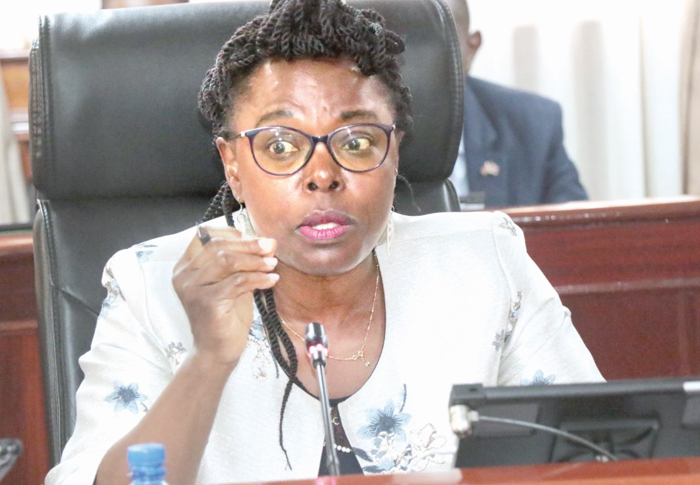Governors owe suppliers Sh160b, says Nyakang’o

As the eighth devolution conference gets underway in Eldoret this morning, 46 governors will be grappling with the billions their administrations owe suppliers since the advent of devolution in 2013.
According to the latest report from the Office of the Controller of Budget, the current governors collectively owed suppliers a whopping Sh159.73 billion as at March this year, up from Sh158.80 billion the previous month, an indication that the figure could be much higher.
According to CoB, only Elgeyo Marakwet had cleared all its pending bills as of March 31 this year while Nyamira and Lamu county governments had the least pending bills of Sh90.2 million and Sh29.7 million respectively.
Twenty-one governors are each grappling with pending bills of Sh1billion and above, with Nairobi’s Johnson Sakaja topping the list with a Sh102.8b debt to suppliers, according to the CoB’s County Governments Budget Implementation Review Report (CGBIRR) for the first nine months of the 2022/23 financial year between July 2022 and March 2023.
The governors of Wajir, Kiambu and Mombasa are grappling with Sh5.38 billion, Sh5.33 billion and Sh4.91 billion bills respectively, raising fears of possible litigation by aggrieved suppliers.
Also owing suppliers billions in pending bills include Machakos (Sh2.88b), Murang’a (Sh2.66 b), Kilifi (Sh2.18b), Mandera (Sh2.12b), Kajiado (Sh2.06b) and Tana River (Sh2.01b).
Embu and Meru county governments on their part owe suppliers Sh1.55b each.
Other county governments owing suppliers pending bills over Sh1billion include Busia, Garissa, Kisii, Kisumu, Kitui, Narok, Nyandarua, Trans Nzoia and Turkana.
According to CoB, only Elgeyo Marakwet had cleared all its pending bills as of March 31 this year while Nyamira and Lamu county governments had the least pending bills of Sh90.2 million and Sh29.7 million respectively. According to the report, county governments had a total of Sh256.47 billion available for spending in the first nine months of FY 2022/23.
“Total County Governments expenditure amounted to Sh239.67 billion where the recurrent expenditure was Sh209.95 billion while development expenditure amounted to Sh29.73 billion,” the report stated.
Between February and March 2023, Nairobi and Kiambu’s pending bills rose by about Sh2billion and Sh1 billion respectively.
“The counties leadership should take charge of the worsening pending bills situation to ensure genuine bills are paid promptly in the remaining months of the financial year,” the Controller of Budget stated in a message directed at Sakaja and Kiambu’s Kimani Wamatangi.
To address the issue, some governors set up internal committees to verify eligible pending bills yielded positive results.
Mombasa and Murang’a for instance, had lowered their pending bills by slightly below Sh1 billion by February this year.
Controller of Budget Margaret Nyakong’o attributed the high pending bills to delays in disbursing the equitable share by the National Treasury saying that as at April 30, County Governments had not received the March and April 2023 disbursements. In the first nine months of FY 2022/23, the CoB had approved the disbursement of Sh183.15 billion as an equitable share of revenue raised nationally from the Consolidated Fund to the various County Revenue Funds.
National Treasury Cabinet Secretary Njuguna Ndung’u has since cleared all dues owed to counties at the beginning of the current financial year.
Nyakang’o noted that the change of county administrations after last year’s general election, and the requirement to undertake a verification process of pending bills has taken time and has also led to a rise in pending bills.
She said: “Untimely approval of supplementary budget estimates to adopt prior-year pending bills in the current budget, political interference and refusal by successive governments to honour obligations led to payment delays.”
She faulted county governments for allowing the pending bills to soar while they retained cash in the County Resource Funds (CRF) accounts.
“Baringo has high pending bills amounting to Sh173.96 million as of 31st March 2023. This is despite the availability of cash in the CRF account, which stood at Sh780.65 million at the end of the first nine months of FY 2022/23,” Nyakang’o said in the report.
Additionally, Nyakang’o identified several fiscal malpractices in the counties which she said were hampering effective budget implementation.
Diversion of funds meant to pay pending bills by the County Treasury, she said and poor budgeting practices caused counties to incur expenditure over approved exchequer issues in several departments.
She urged counties to automate their payrolls and desist from the use of manual payrolls to curb fraud by corrupt county officials. “The manual payroll is prone to abuse and may lead to loss of public funds where there is lack of proper controls,” the report reads.
It adds: “The Government policy is that salaries should be processed through the Integrated Payroll Personnel Database (IPPD) system, counties are advised to fast-track the acquisition of Unified Personnel Numbers for their staff.”
In some counties, Nyakang’o flagged inconsistencies in financial reporting noting that the expenditures by programme and sub-programmes did not tally with the expenditure reporting of departments and the report on expenditure by economic classification.









